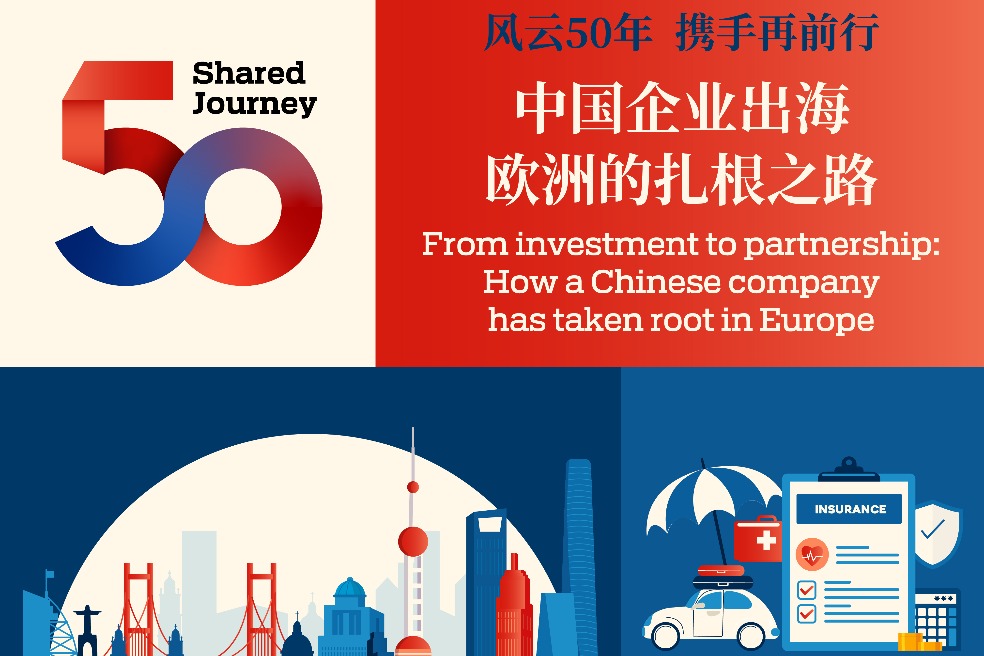'Decoupling' should be in history's dustbin
By Harald Brüning | chinadaily.com.cn | Updated: 2023-06-28 14:52

At Summer Davos on Tuesday Chinese Premier Li Qiang warned against overstretching the concept of the so-called "de-risking" or turning it into a political or ideological tool.
One of the most tangible outcomes of Premier Li's visit to Germany and France last week is that the two countries appear to have left the "Trumpian trade-war threat" of "decoupling" from China on the ash heap of history.
German Chancellor Olaf Scholz and French Prime Minister Élisabeth Borne reassured Li in Berlin and Paris respectively that they reject the notion of decoupling their economies from China's.
The idea of unleashing "complete decoupling" — former US president Donald Trump's terminology — between the world's largest and second-largest economies must be one of the most harebrained schemes ever invented by a Western leader.
The problem is that the "Trumpesque folly" has poisoned relations between the West and China at a time when global cooperation on the greatest possible range of areas is more needed than ever before. Until recently, the toxic notion of decoupling from China, despite its obvious impracticality and self-harm potential, had a growing number of "fan clubs" not just in the US (comprising both Democrats and Republicans) but also elsewhere in the West.
But Scholz said at a joint news conference with Li that Germany rejects all forms of decoupling, and insisted that "de-risking" is not "de-Sinicization".
While I wonder whether his reassuring remarks were fully understood by the general public, they are welcome because they indicate the German government does not pursue an "anti-China" agenda.
However, I still have my doubts about how the conventional business term "de-risking" is used in a political — or even ideology-laden — context by certain Western politicians such as the Greens, which are part of Germany's three-party coalition.
Addressing German business community leaders in Berlin, Li underlined that risk prevention and cooperation are not mutually exclusive, pointing out that "failure to cooperate is the biggest risk, and failure to develop is the biggest insecurity".
The funding of the German people's high standard of living, free education including at the university level and, relatively generous social welfare and public health services depends, to a large extent, on its income from external trade. And China has been, as of last year, Germany's top trading partner for seven consecutive years, ahead of the United States. Of course, foreign trade means interdependence, and all of the world's major economies have interdependent relationships. To a certain degree, economic interdependence requires cooperation which creates business opportunities and, hopefully, wealth.
In Paris, Macron said that in a world full of challenges, France and China should adhere to result-oriented multilateralism, promote international solidarity, improve governance and promote solutions to global issues.
The two-nation trip was Li's first overseas tour as premier. It was a significant and obviously successful visit. Germany is by far the 27-nation European Union's biggest economy while France is the only EU country that is a permanent member of the UN Security Council. Both countries are China's important partners in a wide range of areas, political, economic, cultural, scientific, technological and F&B, French wines and German beers which are popular in China.
The visit was also significant for the other EU countries that, I am sure, wish to have mutually beneficial relations with China, irrespective of how Sino-US relations, which have their very own dynamics and not infrequent ups and downs, are proceeding.
For instance, Portuguese Prime Minister António Costa has said that his country has a "very clear" and stable position on its relationship with China.
Costa underlined that China has respected the terms of the Sino-Portuguese Joint Declaration on the question of Macao, signed by the two sides in Beijing in 1987.
Li's top-level talks in Berlin and Paris took place at a time when analysts are discussing the so-called new Washington Consensus. According to an article by veteran columnist Edward Luce, US national editor of the Financial Times a few weeks ago, "the old Washington Consensus" of the 1980s promoted neoliberal maxims for the developing world and China's inclusion into the global economy, in particular in the run-up to China's accession to the World Trade Organization in 2001. However, the "new Washington Consensus", according to Luce, is now for the West to disengage from China.
No doubt, competition drives development as long as it does not exclude cooperation per se. In the business world, cooperative competition (aka "co-opetition", according to the Jan-Feb 2021 Harvard Business Review) is a welcome concept. Why not in the realm of international relations too?
I agree with the Financial Times columnist that "a full-scale decoupling from China (as still advocated by some in the US in particular) would make everyone poorer and create an Orwellian world of hostile blocs." The glad tidings right now is that the idea of decoupling from China seems to have finally ended up in the ash heap of history.
The author is the director of the Macau Post Daily. The views don't necessarily reflect those of China Daily.
If you have a specific expertise, or would like to share your thought about our stories, then send us your writings at opinion@chinadaily.com.cn, and comment@chinadaily.com.cn.
























